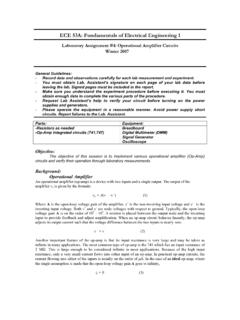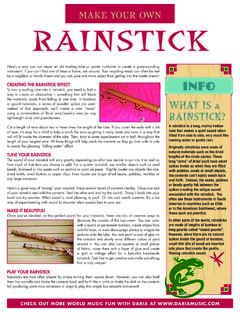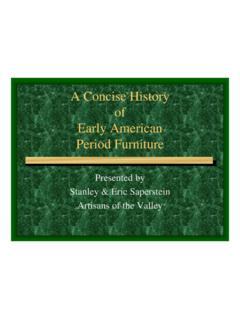Transcription of ). Make it stick: the science of successful learning ...
1 -----------------------Make It stick * 202 would I define them? How do the ideas relate to what I al-ready know? Many textbooks have study questions at the ends of the chapters, and these are good fodder for self-quizzing. Gener-ating questions for yourself and writing down the answers is also a good way to study. Set aside a little time every week throughout the semester to quiz yourself on the material in a course, both the current week's work and material covered in prior weeks. When you quiz yourself, check your answers to make sure that your judgments of what you know and don't know are accurate. Use quizzing to identify areas of weak mastery, and focus your studying to make them strong. The harder it is for you to recall new learning from mem-ory, the greater the benefit of doing so.
2 Making errors will not set you back, so long as you check your answers and correct your mistakes. What your intuition tells you to do: Most studiers focus on underlining and highlighting text and lecture notes and slides. They dedicate their time to rereading these, becoming fluent in the text and terminology, because this feels like learning . Wiry retrieval practice is better: After one or two reviews of a text, self-quizzing is far more potent for learning than ad-ditional rereading. Why might this be so? This is explained more fully in Chapter 2, but here are some of the high points. The familiarity with a text that is gained from rereading creates illusions of knowing, but these are not reliable indica-tors of mastery of the material. Fluency with a text has two strikes against it: it is a misleading indicator of what you have learned, and it creates the false impression that you will re-member the material.
3 By contrast, quizzing yourself on the main ideas and the meanings behind the terms helps you to focus on the central Make It stick * 203 precepts rather than on peripheral material or on a profes-sor's tum of phrase. Quizzing provides a reliable measure of what you've learned and what you haven't yet mastered. More-over, quizzing arrests forgetting. Forgetting is human nature, but practice at recalling new learning secures it in memory and helps you recall it in the future. Periodically practicing new knowledge and skills through self-quizzing strengthens your learning of it and your ability to connect it to prior knowledge. A habit of regular retrieval practice throughout the dura-tion of a course puts an end to cramming and all-nighters. You will need little studying at exam time.
4 Reviewing the ma-terial the night before is much easier than learning it. How it feels: Compared to rereading, self-quizzing can feel awkward and frustrating, especially when the new learning is hard to recall. It does not feel as productive as rereading your class notes and highlighted passages of text feels. But what you don't sense when you're struggling to retrieve new learn-ing is the fact that every time you work hard to recall a mem-ory, you actually strengthen it. If you restudy something after failing to recall it, you actually learn it better than if you had not tried to recall it. The effort of retrieving knowledge or skills strengthens its staying power and your ability to recall it in the future. Space Out Your Retrieval Practice What does this mean?
5 Spaced practice means studying infor-mation more than once but leaving considerable time between practice sessions. How to use spaced practice as a study strategy: Establish a schedule of self-quizzing that allows time to elapse between study sessions. How much time? It depends on the you are learning a set of names and faces, you will need to .. -. Make It stick 204 review them within a few minutes of your first encounter, be-cause these associations are forgotten quickly. New material in a text may need to be revisited within a day or so of yOUI first encounter with it. Then, perhaps not again for several days or a week. When you are feeling more sure of your mas-tery of certain material, quiz yourself on it once a month. Over the course of a semester, as you quiz yourself on new material, also reach back to retrieve prior material and ask yourself how that knowledge relates to what you have subsequently learned.
6 If you use flashcards, don't stop quizzing yourself on the cards that you answer correctly a couple of times. Continue to shuffle them into the deck until they're well mastered. Only then set them aside-but in a pile that you revisit periodically, perhaps monthly. Anything you want to remember must be periodically recalled from memory. Another way of spacing retrieval practice is to interleave the study of two or more topics, so that alternating between them requires that you continually refresh your mind on each topic as you return to it . What your intuition tells you to do: Intuition persuades us to dedicate stretches of time to single-minded, repetitive prac-tice of something we want to master, the massed "practice-practice-practice" regime we have been led to believe is essen-tial for building mastery of a skill or learning new knowledge.
7 These intuitions are compelling and hard to distrust for two reasons. First, as we practice a thing over and over we often see our performance improving, which serves as a powerful reinforcement of this strategy. Second, we fail to see that the gains made during single-minded repetitive practice come from short-term memory and quickly fade. OUI failure to perceive how quickly the gains fade leaves us with the impression that massed practice is productive. , .? Make It stick * 205 Moreover, most students, given their misplaced faith in massed practice, put off review until exam time nears, and then they bury themselves in the material, going over and over it, trying to burn it into memory. Why spaced practice is better: It's a common but mistaken belief that you can bum something into memory through sheer repetition.
8 Lots of practice works, but only if it's spaced. If you use self-quizzing as your primary study strategy and space out your study sessions so that a little forgetting has happened since your last practice, you will have to work harder to reconstruct what you already studied. In effect, you're "re-loading" it from long-term memory. This effort to reconstruct the learning makes the important ideas more salient and mem-orable and connects them more securely to other knowledge and to more recent learning . It's a powerful learning strategy. (How and why it works are discussed more thoroughly in Chapter 4.) How it feels: Massed practice feels more productive than spaced practice, but it is not. Spaced practice feels more diffi-cult, because you have gotten a little rusty and the material is harder to recall.
9 It feels like you're not really getting on top of it, whereas in fact, quite the opposite is happening: As you reconstruct learning from long-term memory, as awkward as it feels, you are strengthening your mastery as well as the memory. Interleave the Study of Different Problem Types What does this mean? If you're trying to learn mathematical formulas, study more than one type at a time, so that you are alternating between different problems that call for different solutions. If you are studying biology specimens, Dutch paint-ers, or the principles of macroeconomics, mix up the examples. Make It stick .. 206 H olV to use interleaved practice as a study strategy: Many textbooks are structured in study blocks: They present the so-lutio n to a particular kind of problem, say, computing the vol-lime of a spheroid, and supply many examples to solve before moving to another kind of problem (computing the volume of :1 cone).
10 Blocked practice is not as effective as interleaved prac-ri<.:e, so here's wha t to do. When you structure your study regimen, once you reach the point where you understand a new problem type and its solution but your grasp of it is still rudimentary, scatter this problem type throughout your practice sequence so that you are alternately quizzing yourself on various problem types and retrieving the appropriate solutions for each. If you find yourself falling into single-minded, repetitive practice of a particular topic or skill, change it up: mix in the practice of other subjects, other skills, constantly challenging your ability to recognize the problem type and select the right solution. H:1rking back to an example from sports (Chapter 4), a baseball player who practices batting by swinging at fifteen fastballs, then at fifteen curveballs, and then at fifteen change-ups will perform better in practice than the player who mixes it up.











